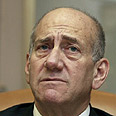

The Prison Service published Monday afternoon the full list of 199 prisoners to be released as a goodwill gesture to Palestinian leader Mahmoud Abbas. The list includes some murderers and collaborators, as well as Palestinians who attempted to carry out terror attacks and murders.
Many of the prisoners slated to be released were convicted of attempted murder, including some convicted of firing at people, possessing weapons and explosives, selling arms, and placing bombs.
Earlier Monday, a ministerial committee headed by Prime Minister Ehud Olmert approved the prisoner release, including two men murdered Israelis.
The prisoners are expected to be freed by the end of the month.
The two men are Muhammad Abu Ali, who murdered a reserve soldier in Hebron and a Palestinian detainee suspected of collaborating with Israel, and Said el-Atba, who planted three explosive devices in Petah Tikva and Tel Aviv markets and in Israeli buses. Israeli citizen Tzila Galili was killed in one of these attacks.
Dichter also objected to the release of another terrorist from Gaza, whose name was eventually taken of the list and who will remain in jail for now.
The internal security minister said during the discussion, "I am convinced that in the extended criterion set for the release of prisoners with blood on their hands, we could find people who have not murdered Israelis or others."
'Prisoner release interpreted as weakness'
Transportation Minister Shaul Mofaz opposed the move as well, stating that "the release of prisoners is not interpreted as a gesture, but rather as weakness. The State of Israel released hundreds of prisoners in recent months, and the situation of Abu Mazen (Palestinian President Mahmoud Abbas) has not changed. Gilad Shalit is still in his kidnappers' hands."
"When Israel frees prisoners to weak elements without demanding anything in return, they remain weak. This is a decision conveying weakness and an acceptance of the existing situation. Why are we helping Abu Mazen instead of taking care of Gilad Shalit's release first?" asked Mofaz.
He added that "in order to achieve our goal, which is security, we must hold negotiations which include a return, negotiations with results, rather than diplomacy which yields nice photo opportunities. We hear about negotiations being held for more than a year, but what has changed? What results have we achieved? What progress have we made this year?"
The prisoner release was approved by the government on Sunday, with 16 ministers voting in favor of the move and four opposing it – Mofaz and three Shas ministers.
A source at the Prime Minister's Office said that according to estimates presented by the defense establishment, the risk that the prisoners with blood on their hand will return to terror "is very very small."
The Prime Minister's Office released a statement saying, "This is a gesture and a trust-building move aimed at bolstering the moderates in the Palestinian Authority and the peace process."
Roni Sofer contributed to the story















